In October 2024, Ubiquiti, known as a major networking vendor, introduced its first network-attached storage (NAS) device, the UNAS Pro. With a full-scale rackmount design, the 7-bay server was clearly made for big business. At the time, I decided to take a pass on it, waiting for a more consumer-friendly unit.
The wait is now over. The company officially unveiled its second attempt at the NAS space on September 18, introducing its “Next-Gen UniFi Storage,” which consists of not one, two, or even three but four new servers, enough to meet the demands of all user demographics.
Next-Gen UniFi Storage: M.2 NVMe SSD support, PoE-powered, UniFi Drive, and more
These new servers include UNAS 2, UNAS 4, UNAS Pro 4, and UNAS Pro 8.
As you might have guessed, the numbers in the names indicate the number of native drive bays each server has to host standard SATA drives. The table below shows their hardware specs.
Ubiquiti UniFi Storage UNAS 2 vs. UNAS 4 vs. UNAS Pro 4 vs. UNAS Pro 8: Hardware specifications
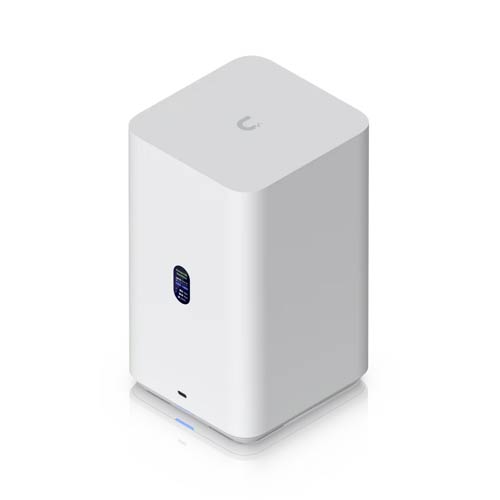 | 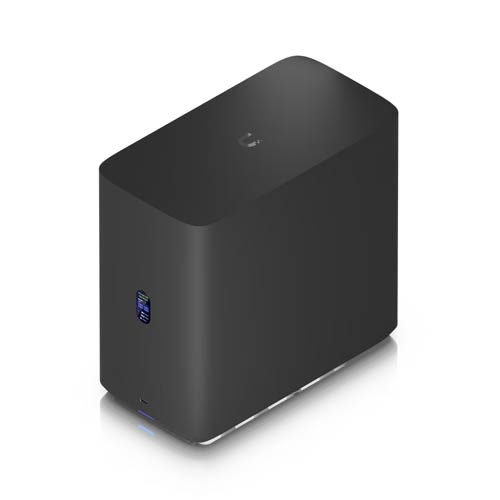 | 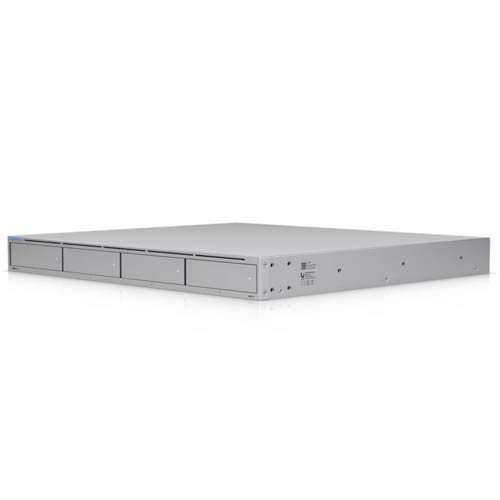 | 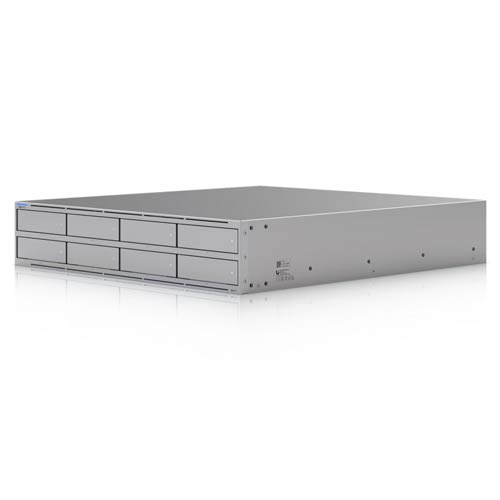 | |
|---|---|---|---|---|
| Model | UNAS 2 | UNAS 4 | UNAS Pro 4 | UNAS Pro 8 |
| CPU | Quad-Core ARM Cortex-A55 at 1.7 GHz | Quad-Core ARM Cortex-A57 at 2.0 GHz | ||
| Memory | 4 GB | 8GB | 16GB | |
| Display | 1.47″ color LCM | None | ||
| Dimensions | 135 x 129 x 223.7 mm (5.3 x 5.1 x 8.8″) | 246 x 129 x 224.5 mm (9.7 x 5.1 x 8.8″) | 442.4 x 400 x 43.7 mm (17.4 × 15.7 × 1.7″) | 442.4 x 480 x 87.4 mm (17.4 × 18.9 × 3.4″) |
| Weight | 1.3 kg (2.85 lb) | 2.6 kg (5.7 lb) | 6.7 kg (14.8 lb) | 11.5 kg (25.35 lb) |
| Storage Capacity | 2x 3.5″ drive bays (3.5″ HDD only) | 4x 3.5″ drive bays (All SATA Drives) 2x M.2 NVMe bays | 8x 3.5″ drive bays 2x M.2 NVMe bays | |
| Network Port | 1x 2.5 GbE RJ45 Multi-Gig PoE++ | 1x 2.5 GbE RJ45 Multi-Gig PoE+++ | 2x 10G SFP+ (10G/1G) 1x GbE RJ45 (1G/100M/10M) | 2x 10G SFP+ (10G Only) 1x 10 GbE RJ45 Multi-Gig |
| Expansion Port | 1x USB-C (USB 3.2 Gen 1) | None | ||
| Power Redundancy | No | Yes | ||
| Design | Desktop | Rackmount (1U) | Rackmount (2U) | |
| Max. Power Budget for Drives | 52W (4.5W max for USB-C) | 80W (4.5W max for USB-C) | 125W | 225W |
| Max. Power Consumption | 60W | 90W | 150W | 250W |
| Power Method | PoE++ | PoE+++ | 1x Universal AC input, 100—240V AC, 3A Max., 50/60 Hz 1x USP-RPS DC input, 11.5V DC, 13.91A | 2x AC input, Hot-swappable power modules |
| Power Supply | 60W PoE++ injector (Included) | 90W PoE+++ injector (Included) | AC/DC, internal, 150W | 2x Hot-swappable AC/DC 550W power modules |
| Ambient Operating Temperature | -5 to 40° C (23 to 104° F) | |||
| Ambient Operating Humidity | 10 to 90% noncondensing | |||
| Warranty | 2 years | |||
| US Launch Price (Compare at UI store!) | $199 | $379 | $499 | $799 |
UNAS Pro: Now with M.2 NVMe SSD bays for caching
The two UNAS Pro servers are the direct upgrade to the original UNAS Pro that came out almost a year ago. The first thing to note is the change in the number of drive bays from odd to even numbers. On this front, the UNAS Pro 8 is practically double the UNAS Pro 4’s capacity and physical size. Additionally, the new Pro servers now come with a built-in M.2 slot for caching and support for an optional redundant power supply.
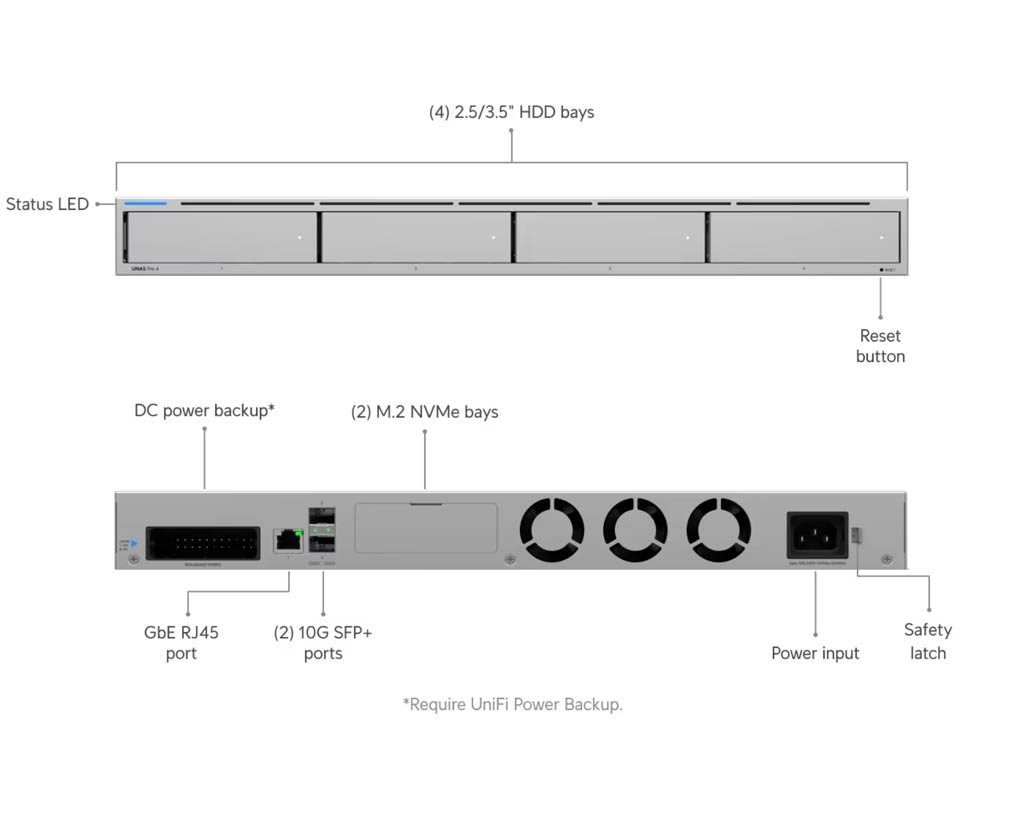
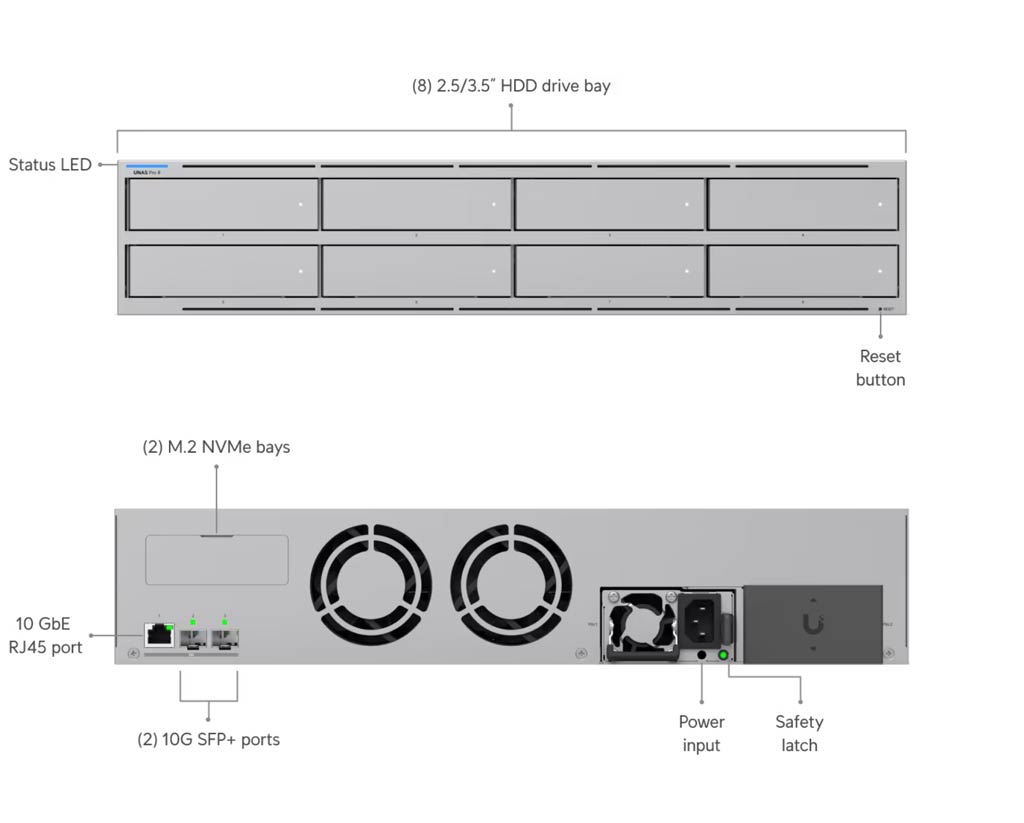
Here are the highlights of the UNAS Pro 4 and UNAS Pro 8 servers:
- Multiple 10G interfaces with MC-LAG support
- Dual M.2 NVMe SSD bays for caching
- Modular, hot-swappable power supplies (UNAS Pro 8)
- Space-saving 1U rackmount design (UNAS Pro 4)
- Enterprise-grade reliability
Consumer-grade UNAS servers: PoE-powered for the win!
On the other hand, the UNAS 2 and UNAS 4 are totally new 2-bay and 4-bay servers. They come in a desktop design, meaning they are made for general users. Both servers share the same design with their drive bays facing the underside.
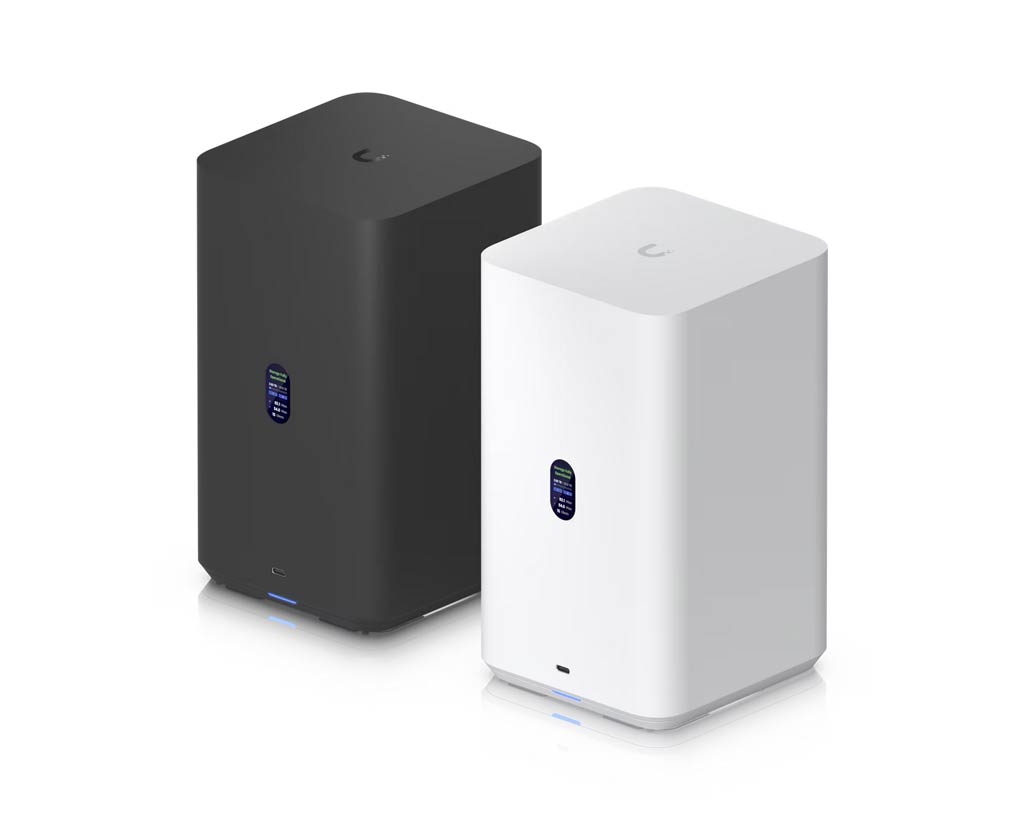
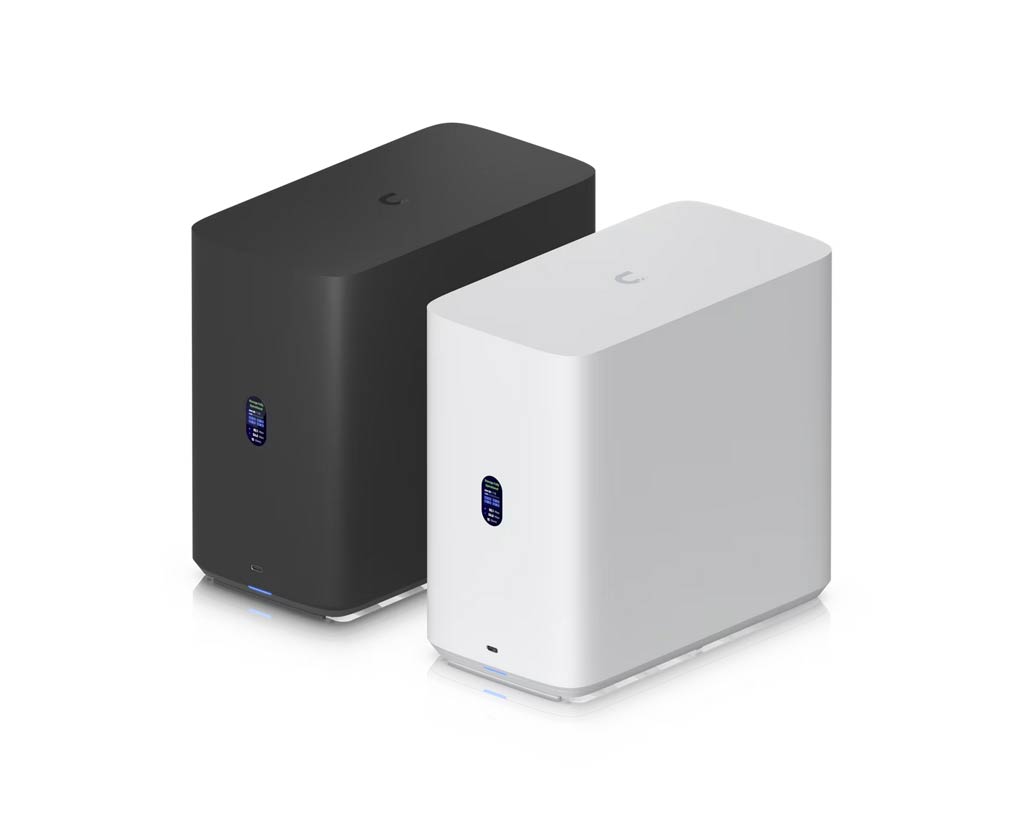
The unique thing about these two consumer-grade servers is the fact that they are the first NAS servers that are PoE powered, allowing for maximum flexibility in terms of placement. You can literally tuck either anywhere you can run a single network cable to.
The UNAS 2’s highlights:
- PoE-powered single-cable setup via a 2.5Gbps PoE++ port (injector included).
- Dual-bay storage design
- USB-C external device support and 5G network card upgrade
- LCM touchscreen for quick navigation
- Simple setup process and management via the UI web user interface or the UniFi mobile app
As the name suggests, the UNAS 4 has double the number of drive bays as the UNAS 2 and, therefore, the physical size. UNAS 4’s highlights:
- Everything UNAS 2 has, including PoE-powered via a 2.5Gbps PoE+++ port (injector included).
- Support for additional HDDs
- Integrated M.2 NVMe SSD slots
- Optimized for high-performance storage
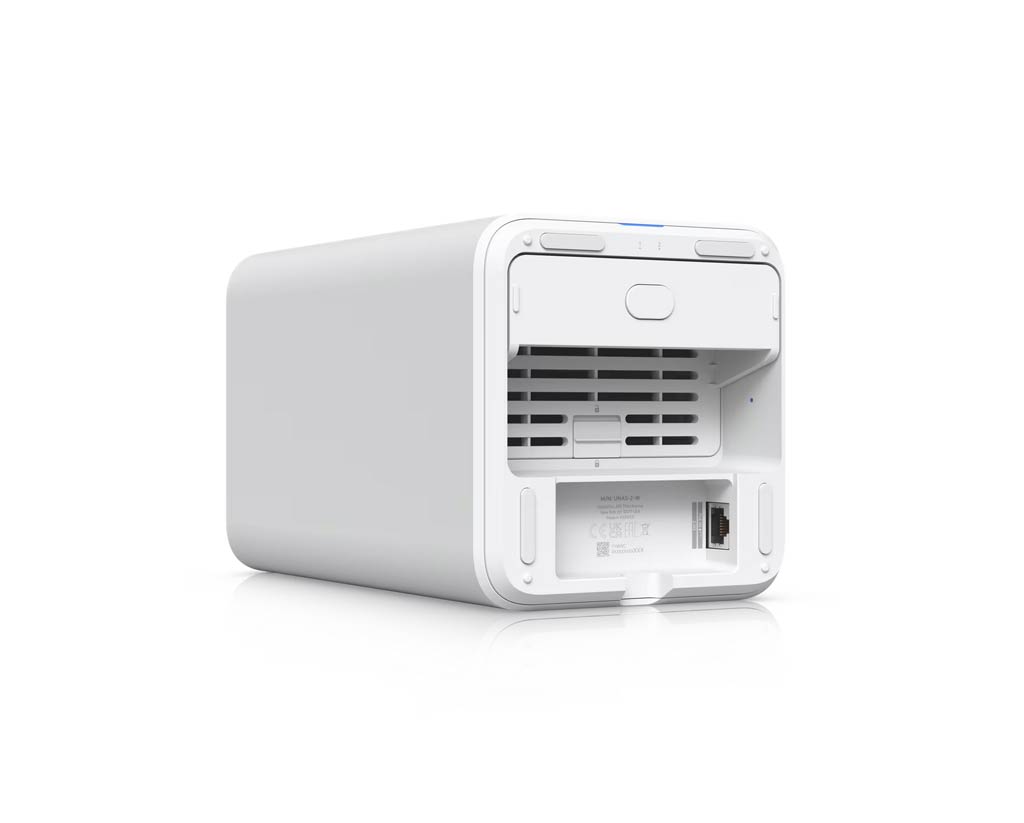
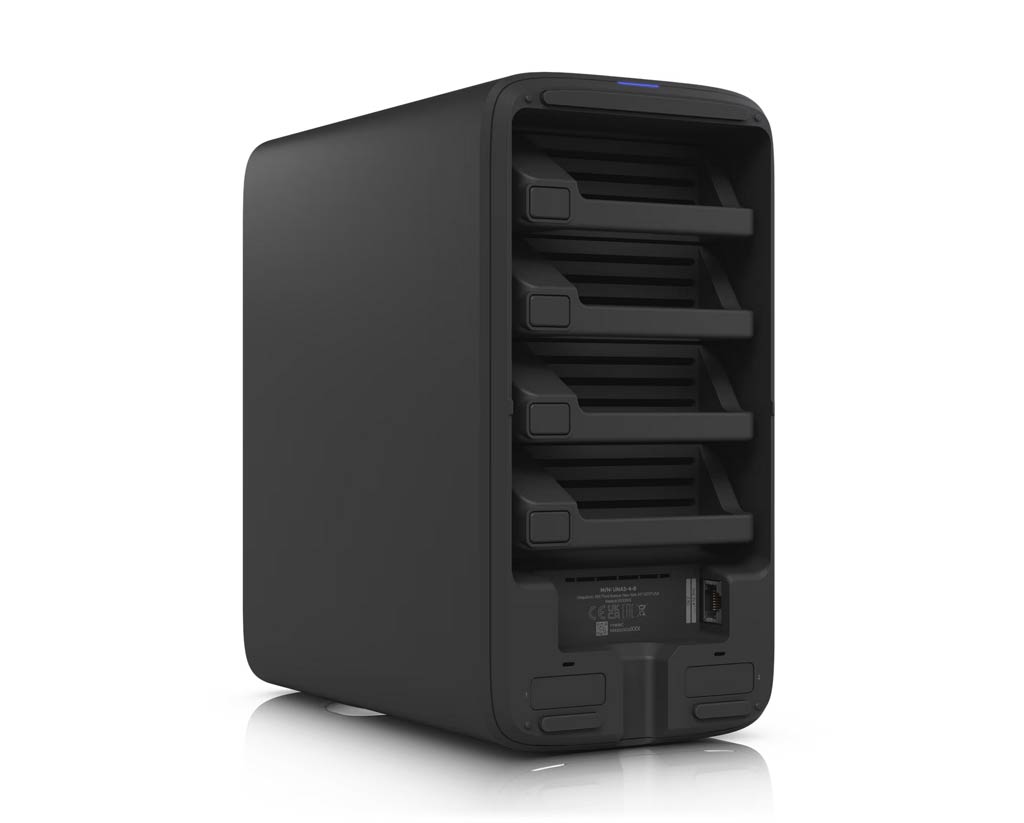
UniFi Drive: The app that powers Ubiquiti’s NAS servers
All of Ubiqiuiti NAS servers are powered by the UniFi Drive app, which runs on its UniFi OS, similar to the case of UniFi Network or UniFi Protect. This new app was recently upgraded to version 3.0, which, among other things, includes a flexible RAID setup that allows users to mix and match drives of different capacities. This improvement makes UniFi NAS servers more competitive, considering Synology, the biggest name in NAS, has had SHR for years.
Other than that, UniFi Drive 3.0 also expands UniFi NAS servers’ capability, including:
- AWS S3, Backblaze B2, and Wasabi backup integrations
- Active Directory support for SMB sharing and access controls
- Customizable fan control with Quiet, Balanced, and Cooling modes
It’s worth noting that UniFi Drive is a license-free application. All new UNAS servers will run UniFi Drive version 3.3 or newer.
Availability and pricing
Ubiquiti’s new UNAS 2, UNAS 4, UNAS Pro 4, and UNAS Pro 8 are slated to cost $199, $379, $499, and $799, respectively. Of the four, only the UNAS 2 is available today, with the rest coming later in 2025.
I’m in the process of getting at least one of them out for a spin. Check back soon to see how the real-world performance pans out.
Update: The in-depth review of the UNAS 2 is now available.



Hi Dong,
The Synology NAS has DSM as an operating system and interface window with multiple apps for the user experience. I have no experience with Unifi Drive. Does it work similarly? Will Unifi have apps running on their NAS? Do you know what the plans or rumours are?
I’m testing the UNAS 2 right now, Patrick. Check back for more.
Will do!
This is really excellent news!
IMHO it’s actually interesting to compare the UNAS Pro and the UNAS Pro 4, considering they are similarly priced. While the former lacks SSD cache (which so far I never used on my Synology), has a weaker processor and takes 2U, it does take 3 more drives, and its only 325mm in depth comparing to 400mm for the latter.
The original NAS Pro has seven drive bays, and the new NAS Pro 4 has only four, plus NVMe support. That’s the reason for the pricing, Dror. You get some you lose some. Other than that, the two are practially the same since they will run the same latest UniFi Drive version.